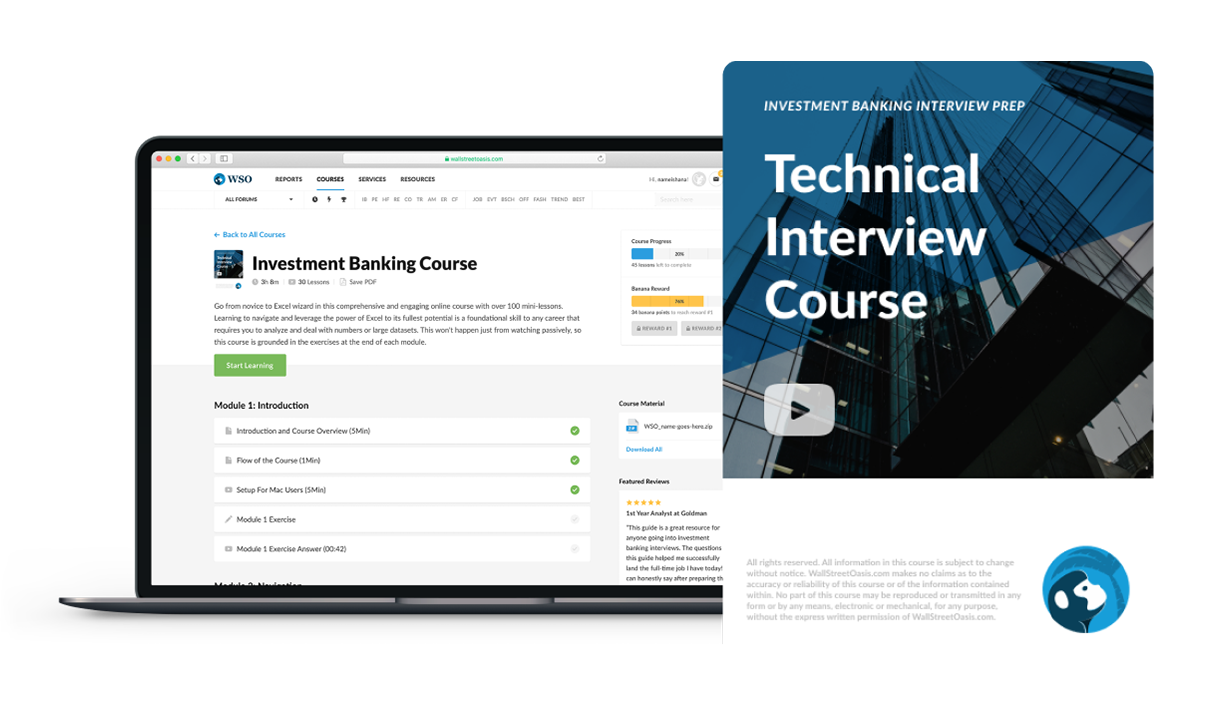
Private Banking Internship
A guide seeks to educate prospective Private Banking interns.
This guide seeks to educate prospective Private Banking interns and uncover what kind of work interns can expect from these internships, the opportunities interns should seize during the internship, and the importance of internships for a head start in their finance career.

Private Banking is a very specialized type of financial service. Thus it has its perks. However, it isn't only full of benefits for clients and disadvantages that will be discussed later on.
Therefore, clients going into Private Banking will complete a full evaluation as to whether Private Banking privileges are worth it.
Before diving into these points, let us try to briefly understand what Private Banking is to see what professionals in the industry do to serve their clients. This will also give us an idea of how interns may see themselves assisting and advising clients.
Private Banking refers to bank services reserved for the bank's wealthiest clients or customers, otherwise known as High-net-worth individuals (HNWI). The value of HWNIs to banks is, as their name suggests, their ability to afford various investment options and schemes.

Most banks offer these special services to clients with at least six figures worth of assets. These services are exclusive and affluent clients who obtain them and have a substantial amount of free cash and assets deposited into investing accounts.
What are the Perks of Private Banking?
Private Banking clients are guaranteed concierge-like services and direct access to their account managers and the lead advisor of the account, meaning immediate transactions can happen at their convenience. Additionally, private account holders enjoy attractive rates.
These perks are offered as they benefit the bank financially. HNWIs guarantee business that generates significant amounts of profit for the bank and new and repeated business. These perks are crucial to maintaining a good customer relationship with their clients.

Private Banking clients are affluent individuals, which guarantees a large pool of money for each client. The bank profits off the client's substantial checking account balances, charging their clients steeper interests for larger loans and mortgages.
Private banks deliver high-quality strategic advice and creative financing solutions to their clients to maintain, protect and grow their assets.
Employees are designated to each client, who are addressed with unique and individualized investment-related advice tailored to their financial circumstances.
Why are the reserved Private Banking services, and how are they more prestigious? The main services offered by Private Banks vary from firm to firm but are generally financial management solutions such as:
- portfolio management
- money management
- tax services
- insurance, trust
- estate planning

Private Banks pursue clients through the personal network of the HNWIs; through them, potential connections are made with more affluent clients. Private Bank divisions then approach these individuals to offer invitations to work with their elite services.
Therefore, all HNWIs are valuable to Private Banks as existing clients provide the bank with business from their activity and the potential for future clients.
Additionally, through tax returns, the bank can access additional personal information by viewing their client's documents and often identify potential customers.
Invitations get extended to these individuals, often bringing Private Banks even more clientele.
Three Advantages of Private Banking
Private Banking is full of benefits and perks that clients find extremely attractive and gives them business advantages, luxuries, and personal uses. Here are some of the main advantages of Private Banking.
1. Having dedicated representatives
Having a Dedicated Representative associated with you is a huge advantage as the staff is already aware of your circumstances.
Additionally, initiating wire transfers, depositing checks, and ordering checks become a much simpler process, i.e., not having to go to the bank in person as the bank understands your situation.
This makes owning a Private Banking account a huge time-saving perk for HNWIs as their business with the bank is much more personal.
2. Better prices, Freebies and
Ultra-high net worth individuals may be able to receive benefits such as free checks and free safe-deposit box size.
Some professionals have mentioned free VIP events hosted for Private Bank clients.
3. Business funding Benefits
Because of the financial benefits of Private Banking, Business owners can take advantage of them by financing their businesses through Private Banking rather than just having their wealth management account.

Three Disadvantages of Private Banking
Apart from the perks and benefits, Private Banking clients watch out for these elements when evaluating whether to open accounts.
1. High Management Fees
Private Banking typically costs clients 1% of their overall investments per annum. Clients should cross reference fees from different Private Banks to see which costs for money management suit them.
2. Private Bankers may leave their jobs.
Private Banking forms a personal connection the client has with the bank. The quality of the services and overall customer satisfaction mostly comes from how the client perceives the representative.
Therefore, if the banker associated with a client decides to leave the institution, the client has a difficult decision as to whether they want to entrust a new, unfamiliar employee or switch banks.

3. You may be losing out on interest
Private Banking offers clients a lower annual yield than regular banking. High Net Worth Individuals will consider this when opening accounts.
For example, the current state of the US economy in 2022 makes Private Banking accounts that yield low annual percentages unattractive, as opposed to commercial accounts that offer higher yields.
Key legal information regarding the role:
Private Banks often include a non-compete clause in their employment contracts to prevent unsatisfied employees from leaving the firm and taking the client associated with them.
Now that we have concluded what Private Banking is, the next step is figuring out what to expect during a Private Banking internship.
What to expect in Private Banking internships
As a client, the experience varies significantly from commercial to private. In Private Banking, clients are treated with much more importance, and access to services is guaranteed immediately.

Unlike commercial banking, Private Banks operate on a more personalized level. Interns can expect to assist clients with asset management, potential investments, and financial planning, such as inheritance-related management, dispute settlement, and legal counsel.
Therefore, interns in Private banks should expect to be given a variety of tasks for one client.
So what jobs are given to interns? If you participate in a banks Advisor Internship, you gain exposure to advising clients on investments, lending, banking, and trust and estate planning.
Interns can expect to work alongside specialists who will support the interns in researching, analyzing, and developing global investment strategies and investment opportunities for clients.

Some interns may express more interest in wealth management, while others may feel more drawn to client relationship management.
The difference is that a wealth manager might only be responsible for managing one customer's portfolio.
On the other hand, relationship managers are responsible for maintaining good ties with all existing clients and finding new potential clients. Therefore, relationship managers can expect to communicate more than wealth managers.
Interns with specific skill sets can also choose to apply their skills by being appointed to specific customers. For instance, computer science students with an affinity for cryptocurrencies can apply their skills to help a client acquire crypto assets.
What Qualities in Interns are valued by Major Banks?
- Highly Motivated Students
- Exceptionally articulate Students
- Energy to work
- Confidence
- Integrity
- Willingness to take initiative
- Good judgment
- Discretion when working with confidential information
What Skills in Interns are valued by Major Banks?
- Excellent communication and presentation skills
- Strong quantitative skills
- Passionate about investing
- Excellent organization
- Exceptional ability at multitasking
- Diverse backgrounds that can genuinely connect with clients
Why are Private Banking internships valuable?
The opportunity to dive into an experience you choose for yourself is a unique plus in this internship. It benefits students by gaining valuable experience tailored to their finance or client relations interests.

However, understand that smaller middle market banks operate on more minor scales and may not offer such flexible job role choices.
Therefore, a student with strong communication skills who want to specialize in the customer relations aspect of the firm may have to focus just as much on wealth management to fulfill both roles.
The work set out is much more specific than internships in Investment Banking or Private Equity, as this work narrows its focus to keeping clients happy and assisting them in utilizing or investing their funds.
Therefore, this internship presents itself as an opportunity to work closely with HNWIs, helping them acquire assets they are interested in and, in turn, improving their relationship with the bank.
This is a valuable experience for interns because rarely are chances to speak and work directly with clients given out to interns in other areas of banking, which can give rise to valuable future networks and an opportunity to practice building professional relationships.

This experience improves an intern's financial and people skills, as maintaining and enhancing client relationships determine a Private Bank's success.
On-The-Job Experience:
As mentioned previously, Private Banks offer highly customized and comprehensive solutions to help protect, manage and grow clients' wealth.
Since no client is the same, understanding their unique needs requires work across teams and the firm to meet the client's specific needs to offer the highest level of client service.
Training:
Most internships range from 5-13 weeks.
Throughout this time, the first week is usually spent on introducing interns to the firm; for interns at the top banks, the remainder of the summer internship is allocated to attending senior speaker events, networking opportunities, and unique skill-building workshops for the interns.

Career Progression:
A summer analyst program can give job applicants in the finance industry a considerable leg up in their careers. Interns that complete the entire program and are generally liked by the staff can expect to be offered the opportunity to return upon graduation for a full-time role.
Here is some key information about the hiring process:
Resume
It is important to make your resume stand out. Your resume will be the first chance these big banks will get to know you. Making the right first impression could determine your career path, so the resume must be made to a professional standard.
When applying with a resume, make sure to tailor the resume to the role you are applying for, as the recruiter wants to see the relevant experience that makes you suitable. Simply put, ensure that you amplify your achievements and remove irrelevant experiences.
Sharing completed projects and the metrics that measure success can be beneficial. When doing so, remember that the recruiter is an outside observer who may not understand the metrics the same way you might.
So highlighting these metrics or making them easy to understand from an outsider's point of view is important. Simple and concise explanations are effective and sound more professional than long-winded "impressive sounding" but meaningless sentences.

When writing about leadership, define how your leadership affects others. Mention examples that support your leadership qualities. Writing about internships or student coursework projects are helpful examples to demonstrate your academic or teamwork skills and should be mentioned if possible.
However, whenever mentioning an experience, think about its purpose and what it highlights about you.
When talking about Strengths and Weaknesses, think about challenges and real examples that support these. instead of just stating them, make sure these examples are work-appropriate and relevant enough to mention.
Remember that a resume is brief; there are chances to share more later. Keep things concise, and the recruiter will appreciate your resume. A simpler resume will also help you avoid being grilled with questions during the interview, which is more likely to happen if you fill out your resume way too much.
The information in the resume and interview want to be relevant to the role; cutting things down helps to focus the conversation on relevant strong points that will land you the role.
Interview
It is important to prepare for interviews. Companies are required to test the knowledge of their candidates to see their genuine preparation and level of interest in the role they are applying for.
Remember that answering interview questions without hesitation helps you memorize the skills, knowledge, and interest for the role. Understanding what you bring to the table is key.

In terms of skills, they want transferable skills from past experiences. In terms of knowledge about the role, expect questions (and if you don't know the answer to them, it's okay to be honest, firms appreciate honesty in their candidates too). Imagine and research some questions about the firm and memorize your answers days before the interview.
Remember that internships last for over a month, put yourself in the recruiter's shoes, could you stand to be around an intern who chooses to hide their personality from the recruiting staff?
The lesson here is to be open about yourself in a humble way. At jobs and internships, students should be professional, but that mostly comes through a level of casual respect rather than acting machinelike and purely being interested in work.
Recruiters want to know that the interns they see around for the next 9-13 weeks will settle in and break into the working culture well.
Think about the kind of worker you would like to work alongside, you don't need to mold yourself into a new person, but it helps to be relaxed, honest and outspoken in a respectful tone when making comments.

Remember: If you are doing a digital interview, this is not an excuse to dress unprofessionally. A shirt and jacket are standard interview attire and should remain that way even if you take them from home.
Nevertheless, you should make yourself comfortable. As mentioned, being relaxed and natural is a quality that is highly appreciated.
Another tip is to dress formally; being comfortable is one thing, but feeling ready for the role is another, and attire can play a role in your mindset.
Attending the zoom interview with a shirt, jacket, and tie on top and shorts on the bottom will not give you the sense of readiness that a full suit will.
The interviewer would appreciate a candidate that wants to learn more about the role and its opportunities, this is why a well-prepared candidate is someone who:
- Understands the scope of the role
- Understands the skills they must learn during the internship
- Is inquisitive about the firm
- Is Honest
- Is relaxed and being themselves during the interview
- Understands how to effectively apply themselves during the internship
FAQs
It is crucial to know that Investment Banking and Private Banking are different financial services. Private Banking refers to services that are offered by banks, which differ completely from commercial banks.
As you know by now, Private Banking financial services focus on client relationships and wealth management. Private Banking caters more to helping clients through securities trading and brokerage as well as looking for safe investments.
On the other hand, Investment Banks offer services such as assisting in financial transactions, helping to structure deals, and underwriting equity and new debt securities. They may also help private companies go public by offering securities.

Everything You Need To Break into Investment Banking
Sign Up to The Insider's Guide on How to Land the Most Prestigious Jobs on Wall Street.
Researched & Authored by Sevriano Battista | LinkedIn
Free Resources
To continue learning and advancing your career, check out these additional helpful WSO resources:
.jpg?itok=DxumzaOP)

or Want to Sign up with your social account?